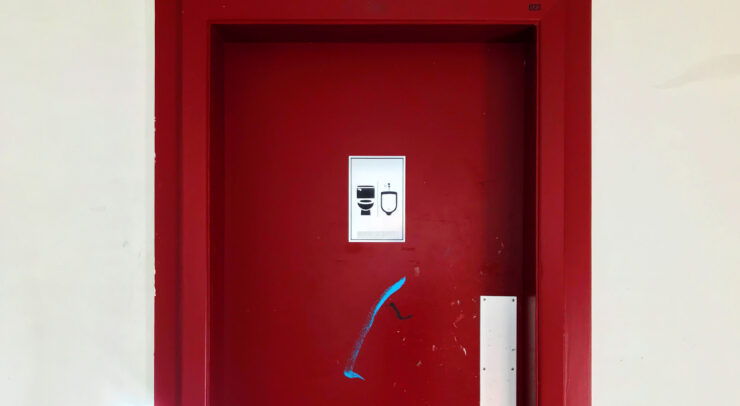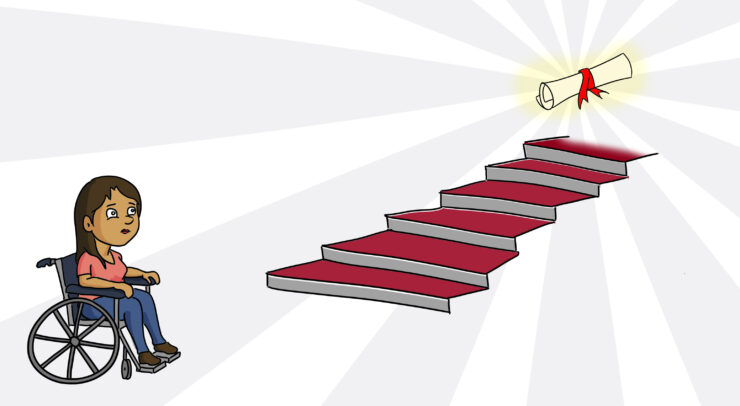Some students say the university lacks consideration and effort in accommodating their disabilities
When third-year psychology student Deandre Robinson was in the midst of applying to the University of Ottawa four years ago, she says one of the school’s resident advisors cautioned her to enrol elsewhere, due to the number of mobility issues that exist on campus for wheelchair users.
“He told me — I thought he was lying — he told me that every single year, he had at least six people come in and not be able to stay because winter hits and they can’t get anywhere,” said Robinson, who’s been using a wheelchair for eight years now.
She decided to apply to the U of O anyway, since the school offered minors in gerontology and Russian language and culture.
But during her first winter here, Robinson would later find out that there was no lie in the resident advisor’s warning.
“I can’t go to anything past Laurier (Avenue) because the City of Ottawa doesn’t plow it, but neither does the U of O,” she said. “The only reason I was able to get anywhere in the past three years in the winter is because people physically picked up my chair when I was crossing Laurier because I got stuck in the road.”
When she tried to complain about this issue to the school, Robinson said that she was told that “it’s not our job.”
“So I contacted the MP for this area of Ottawa, and they were like, ‘Well, it’s not like we can do anything about it. It’s U of O property,’” she said. “I don’t know who’s fighting who over this, but this tiny little stretch is preventing me from being able to get to a quarter of the campus.”
As a result, Robinson has no choice but to ask her caseworker at the school’s Student Academic Success Service (SASS) to avoid placing her classes in buildings past Laurier Avenue during the winter.
“While I don’t regret being here, I do regret my disability now that I’m here, which sucks because I’ve never really considered myself disabled until I came here,” she said.
Robinson is just one of hundreds of U of O students with disabilities who consistently face barriers to accessibility on campus. While the school’s SASS service offers a variety of accommodations for students with physical and learning disabilities, several students argue that — outside of SASS and their resources — the university as a whole is still lacking in their efforts to accommodate their disabilities.
Morgan Wall, the supervisor of campaigns for the University of Ottawa Students’ Union’s (UOSU) Centre for Students with Disabilities, said that barriers exist all over campus, and “there is not a conscious effort to remove them.”
“The amount of loopholes the students have to jump through to get their accessibility is obscene,” said Wall. “You have to prove you’re disabled enough to get accommodations in the first place.
“For conditions that are permanent, they can and will try and ask for documentation that’s more new, even if it’s a condition that’s never going away.”
Wall added that she’s had to reprove to the university four times that she has autism.
“The emotional burden that’s placed on our disabled students because we base around the idea of accommodation and not acceptance is bonkers. It’s a second full-time job just to exist,” she said.
When you start dealing with departments aside from SASS, she continued, “it can become a struggle.”
“It’s difficult to find out what buildings even are accessible. There’s a lot of unclear navigation when it comes to disability,” she said. “There’s a lot of hoops that we jump through. And it’s difficult to get support.”
According to Vincent Beaulieu, the interim manager for SASS’s Academic Accommodations Service, more than 3,200 students are registered at their office — roughly 7.5 per cent of the student population.
“There’s a lot of different reasons for students who register with our office. We do an assessment with the student, and it’s all based on medical documentation, accommodation history,” said Beaulieu. “And then we set up a personalized accommodation plan with each student. Those accommodations can vary. It really depends on the needs of each individual student.”
In-class accommodations offered by SASS includes note-taking support, sign language interpretation for hearing impaired or deaf students, converting material to braille for blind students, and more.
Another resource offered by SASS is their exam centre, which sees more than 25,000 exams written in the space every year, according to Beaulieu.
“These are adapted exams and in most cases — what we’re seeing is — low auditory distraction, low visual distraction, extra time, specialized software, specialized equipment — those would be the types of accommodations that we would provide in the exam centre,” said Beaulieu.
Sarah No, a second-year biomedical science student, lives with dyslexia and memory loss, so she requires extra time when writing an exam for reading, remembering and processing information.
She said that she uses SASS’s exam centre for its quiet setting and the 75 per cent extra time they provide over the regular exam time.
However, she recalled one instance where the university disregarded her accommodations by refusing to grant her extra time on a practical lab exam.
“I don’t think I should need to break three pieces of glassware and have an anxiety attack in a lab exam because I am not able to have extra time on practical exams. An exam is an exam,” she said. “I should be allowed my extra time regardless of the exam type. $150 in broken glass-ware could have been prevented had I been given my normal exam accommodations.”
When speaking to the school about this matter, she said the university told her that they didn’t want to pay a SASS proctor to monitor the exam, and that “it’s not needed.”
Gabriel.le Crovasce, a second-year criminology and feminist and gender studies student, said that the school needs to start listening to their students with disabilities and take their concerns more seriously.
“I have a lot of disabled friends and they’re always criticizing the school. We talk about it a lot,” said Crovasce. “We have talked about this with the services — with SASS and everything — and they just don’t listen to us.”
They added that there is little consideration for students with disabilities.
“Accessibility is not something that comes in mind. We always need to remind people that we exist and that we need to be included in the conversation, in the community environment,” they said.
What needs to change, they said, is more consideration for students with disabilities, and more allies to help amplify their voices.
“We need to be in the discussion, part of the discussion and part of the change,” they said.




